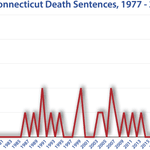
State & Federal
Connecticut

History of the Death Penalty
In colonial Connecticut, capital crimes included idolatry, witchcraft, and blasphemy.
Famous Cases
The first person executed for witchcraft in what is now the United States was Achsah Young, who was executed in Hartford in 1647.
In 1786, Hannah Occuish, a 12-year-old Native American girl, was hanged in New London for the murder of a young white girl. She may have been the youngest person ever executed in the United States.
The last person executed in Connecticut who had exhausted all appeals was Frank Wojulewicz, who was executed in 1959 for murdering a police officer and bystander while committing a robbery. The two men executed since then both dropped appeals and “volunteered” for execution.
Notable Commutations/Clemencies
Connecticut is one of five states that gives clemency authority to a board, rather than the governor. No death row prisoner was granted clemency during the period in which the death penalty had been reinstated.
Milestones in Abolition/Reinstatement
In 2009, the Connecticut legislature passed a bill to abolish the death penalty, but the bill was vetoed by Governor M. Jodi Rell.
In 2012, Connecticut abolished the death penalty for future crimes. Eleven men remained on death row until 2015, when the Connecticut Supreme Court ruled by a vote of 4 – 3 in State v. Santiago that the death penalty violated the state constitution. The Court indicated at that time that the remaining death row prisoners were entitled to be resentenced to life without parole. However, after one of the justices in the Santiago majority left the Court, prosecutors sought and were granted permission to re-open the issue. On May 26, 2016, in State v. Peeler, the Court reaffirmed its holding in Santiago by a vote of 5 – 2.
The remaining death-row prisoners were resentenced one at a time, as their cases were decided in the lower courts. On December 6, 2018, Richard Roszkowski became the last of the eleven formerly death-row prisoners to be formally resentenced to life without possibility of release.
Other Interesting Facts
Connecticut carried out only one execution in the modern era of the death penalty. Michael Ross was executed by lethal injection in 2005 after giving up his appeals.


Connecticut Execution Totals Since 1976
News & Developments
News
Jun 04, 2025
2025 Roundup of Death Penalty Related Legislation
More than one hundred bills have been introduced this year in 34 states and in Congress to expand and limit use of the death penalty, abolish and reinstate the death penalty, modify execution protocols and secret the information about them, and alter aspects of capital trials. Thus far, nine bills in five states have been enacted, with Florida enacting the most legislation. Of the bills that have been signed into law, three modify execution protocols; two expand…
Read MoreNews
Jan 13, 2025
Connecticut Lawmakers Introduce Bill to Prohibit the Production and Manufacturing of Lethal Injection Drugs and Other Materials for Executions
On January 10, 2025, three Connecticut lawmakers introduced a bill that would make it illegal to manufacture and sell any drugs or medical devices in the state meant to carry out the death penalty. In 2024, Connecticut-based company Absolute Standards was identified as the source of lethal injection drugs used in 13 federal executions in 2020 and 2021. In a letter to the bill’s sponsors, John Criscio, President of Absolute Standards, said the company ceased production…
Read MoreNews
Jul 02, 2024
Federal Execution-Drug Supplier Says It Will No Longer Produce Pentobarbital for Executions
Connecticut-based company Absolute Standards, which was identified as the source of lethal injection drugs used in 13 federal executions in 2020 and 2021, has said it will no longer produce the drug used in executions — pentobarbital. In a letter to two Connecticut lawmakers, John Criscio, president of Absolute Standards, said the company ceased producing pentobarbital in December 2020, and has“no intention to resume any production or sale of…
Read MoreNews
Aug 01, 2022
Massachusetts Formally Exonerates Last ‘Witch’ Wrongfully Condemned During Salem Hysteria. Will Connecticut Follow Suit?
As Massachusetts formally exonerated the last person condemned for witchcraft in the colony, efforts are under way to clear the names of the 46 people wrongfully charged with witchcraft in neighboring Connecticut during the 17th century…
Read MoreNews
Aug 09, 2020
Capital Case Roundup — Death Penalty Court Decisions the Week of August 3, 2020
NEWS (8/6/20) — Connecticut: The Connecticut Supreme Court granted a new trial to former death-row prisoner Lazale Ashby. The court ruled that the prosecution had violated Ashby’s Sixth Amendment right to counsel“by using a jailhouse informant … to deliberately elicit certain incriminating statements from the defendant.” The court said that the informant, who had a past history of providing assistance to prosecutors, had been acting as an…
Read More


